Contemporary People Management
VerifiedAdded on 2023/04/21
|8
|2233
|244
AI Summary
This paper focuses on the principle of human resource management in organizations with special emphasis on Kant’s philosophy regarding ethics and morality and its differences with the utilitarian view of ethics. It provides recommendations to organizations regarding improving ethics and morality in context of human resource management.
Contribute Materials
Your contribution can guide someone’s learning journey. Share your
documents today.
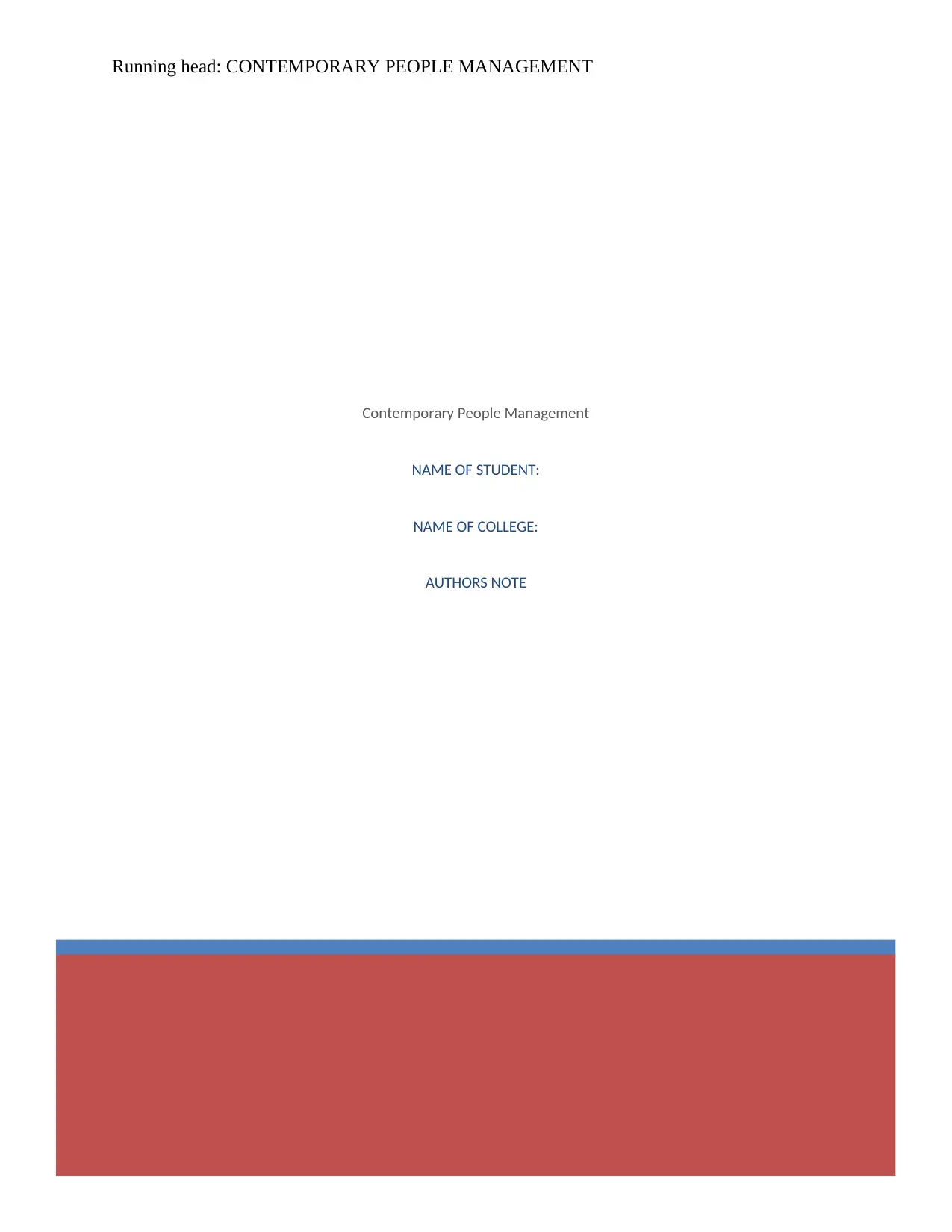
Contemporary People Management
NAME OF STUDENT:
NAME OF COLLEGE:
AUTHORS NOTE
Running head: CONTEMPORARY PEOPLE MANAGEMENT
NAME OF STUDENT:
NAME OF COLLEGE:
AUTHORS NOTE
Running head: CONTEMPORARY PEOPLE MANAGEMENT
Secure Best Marks with AI Grader
Need help grading? Try our AI Grader for instant feedback on your assignments.
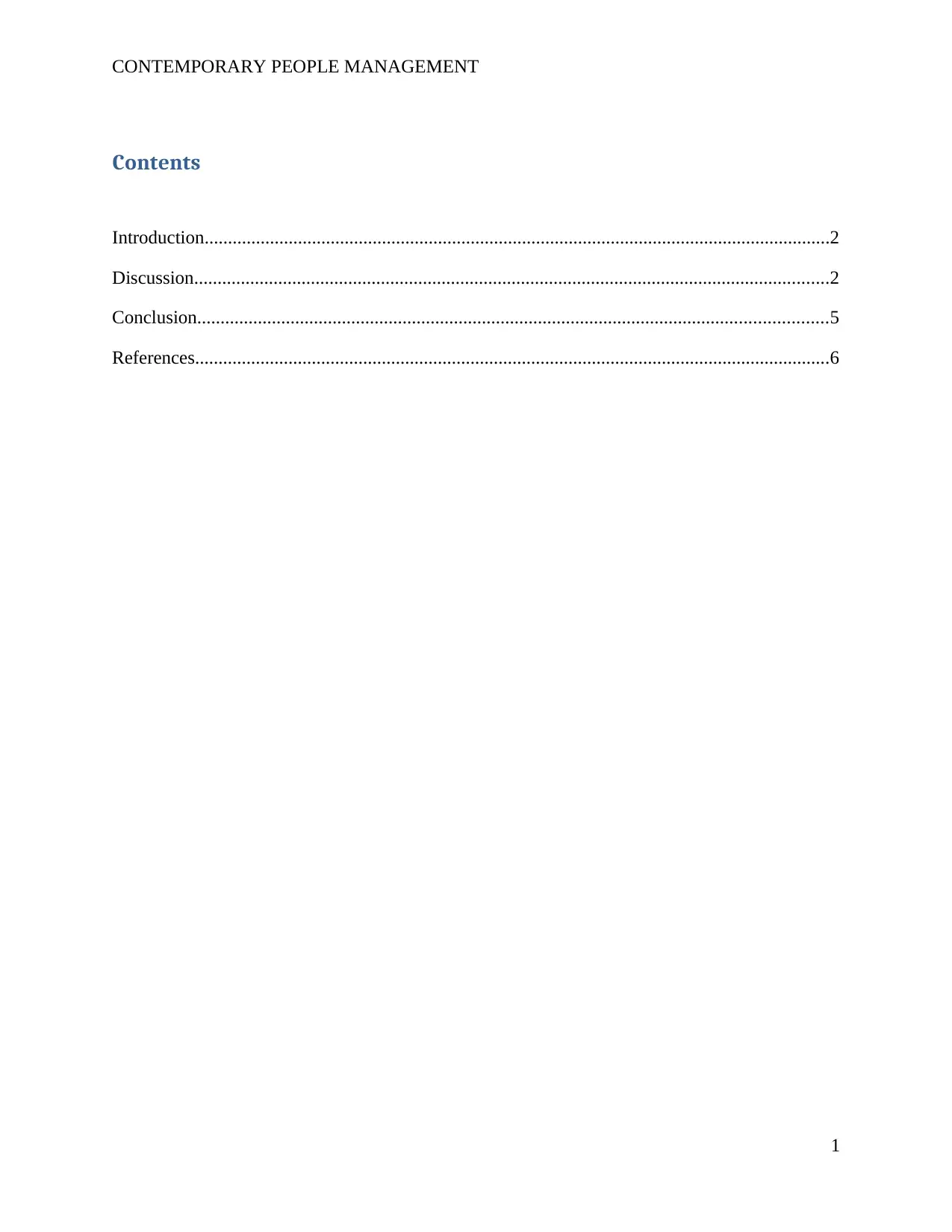
CONTEMPORARY PEOPLE MANAGEMENT
Contents
Introduction......................................................................................................................................2
Discussion........................................................................................................................................2
Conclusion.......................................................................................................................................5
References........................................................................................................................................6
1
Contents
Introduction......................................................................................................................................2
Discussion........................................................................................................................................2
Conclusion.......................................................................................................................................5
References........................................................................................................................................6
1
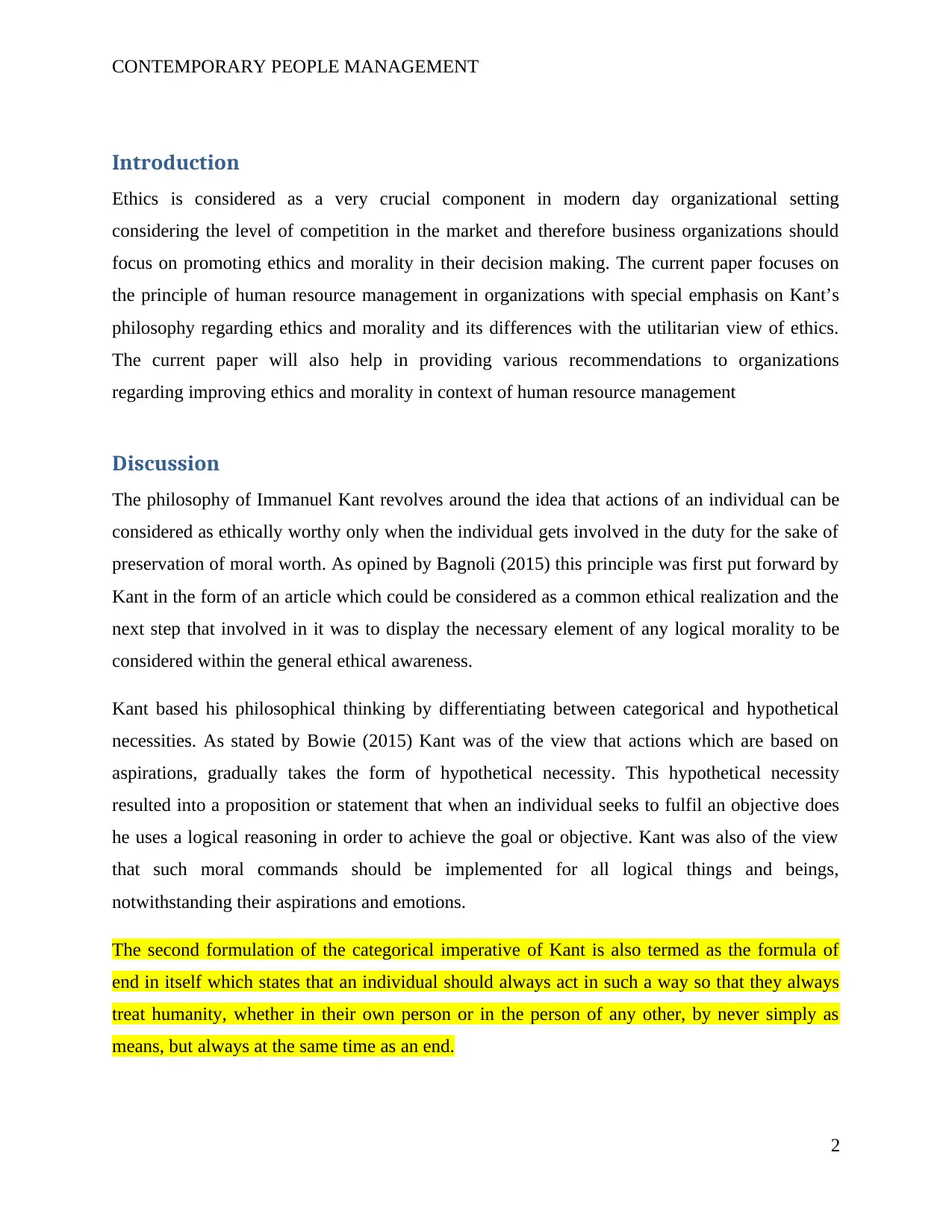
CONTEMPORARY PEOPLE MANAGEMENT
Introduction
Ethics is considered as a very crucial component in modern day organizational setting
considering the level of competition in the market and therefore business organizations should
focus on promoting ethics and morality in their decision making. The current paper focuses on
the principle of human resource management in organizations with special emphasis on Kant’s
philosophy regarding ethics and morality and its differences with the utilitarian view of ethics.
The current paper will also help in providing various recommendations to organizations
regarding improving ethics and morality in context of human resource management
Discussion
The philosophy of Immanuel Kant revolves around the idea that actions of an individual can be
considered as ethically worthy only when the individual gets involved in the duty for the sake of
preservation of moral worth. As opined by Bagnoli (2015) this principle was first put forward by
Kant in the form of an article which could be considered as a common ethical realization and the
next step that involved in it was to display the necessary element of any logical morality to be
considered within the general ethical awareness.
Kant based his philosophical thinking by differentiating between categorical and hypothetical
necessities. As stated by Bowie (2015) Kant was of the view that actions which are based on
aspirations, gradually takes the form of hypothetical necessity. This hypothetical necessity
resulted into a proposition or statement that when an individual seeks to fulfil an objective does
he uses a logical reasoning in order to achieve the goal or objective. Kant was also of the view
that such moral commands should be implemented for all logical things and beings,
notwithstanding their aspirations and emotions.
The second formulation of the categorical imperative of Kant is also termed as the formula of
end in itself which states that an individual should always act in such a way so that they always
treat humanity, whether in their own person or in the person of any other, by never simply as
means, but always at the same time as an end.
2
Introduction
Ethics is considered as a very crucial component in modern day organizational setting
considering the level of competition in the market and therefore business organizations should
focus on promoting ethics and morality in their decision making. The current paper focuses on
the principle of human resource management in organizations with special emphasis on Kant’s
philosophy regarding ethics and morality and its differences with the utilitarian view of ethics.
The current paper will also help in providing various recommendations to organizations
regarding improving ethics and morality in context of human resource management
Discussion
The philosophy of Immanuel Kant revolves around the idea that actions of an individual can be
considered as ethically worthy only when the individual gets involved in the duty for the sake of
preservation of moral worth. As opined by Bagnoli (2015) this principle was first put forward by
Kant in the form of an article which could be considered as a common ethical realization and the
next step that involved in it was to display the necessary element of any logical morality to be
considered within the general ethical awareness.
Kant based his philosophical thinking by differentiating between categorical and hypothetical
necessities. As stated by Bowie (2015) Kant was of the view that actions which are based on
aspirations, gradually takes the form of hypothetical necessity. This hypothetical necessity
resulted into a proposition or statement that when an individual seeks to fulfil an objective does
he uses a logical reasoning in order to achieve the goal or objective. Kant was also of the view
that such moral commands should be implemented for all logical things and beings,
notwithstanding their aspirations and emotions.
The second formulation of the categorical imperative of Kant is also termed as the formula of
end in itself which states that an individual should always act in such a way so that they always
treat humanity, whether in their own person or in the person of any other, by never simply as
means, but always at the same time as an end.
2
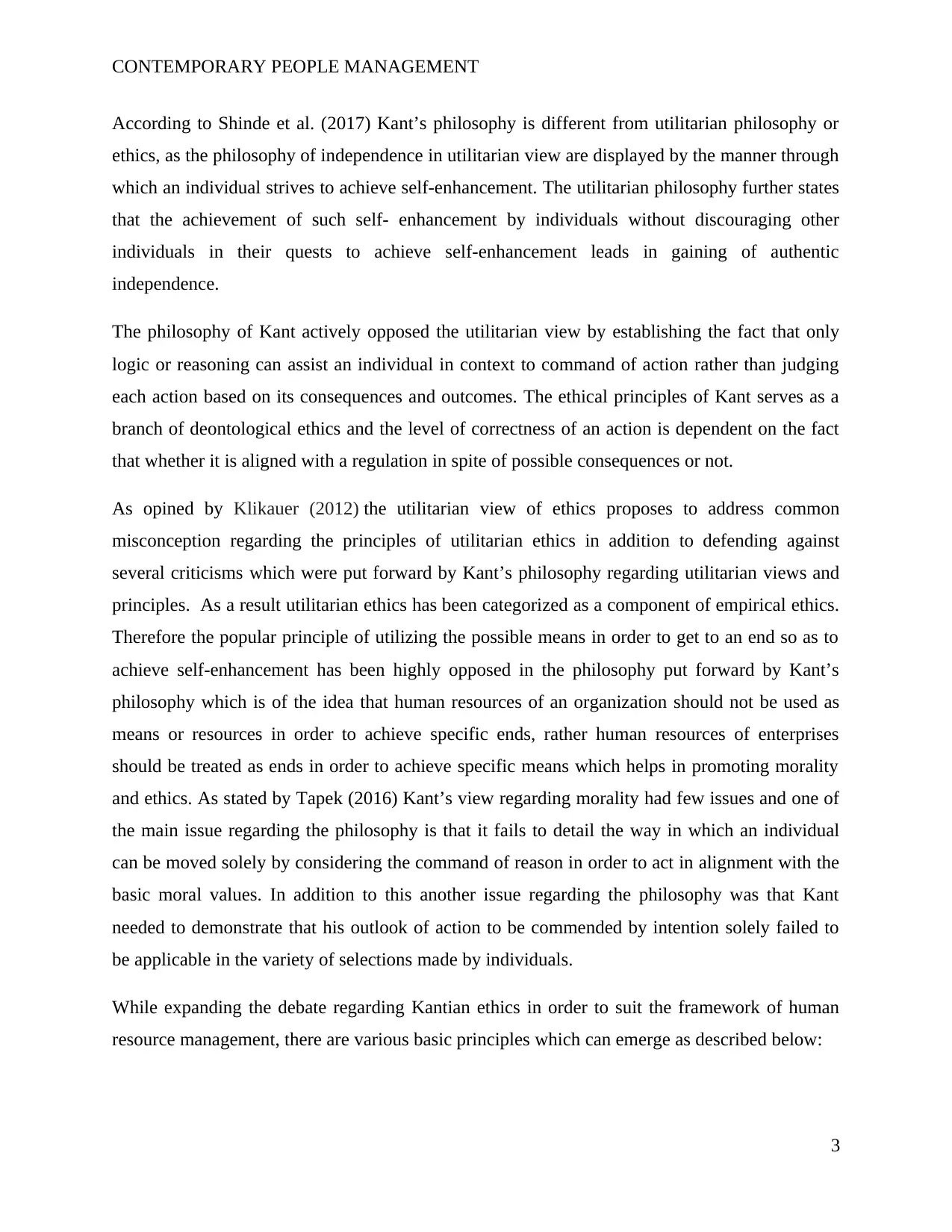
CONTEMPORARY PEOPLE MANAGEMENT
According to Shinde et al. (2017) Kant’s philosophy is different from utilitarian philosophy or
ethics, as the philosophy of independence in utilitarian view are displayed by the manner through
which an individual strives to achieve self-enhancement. The utilitarian philosophy further states
that the achievement of such self- enhancement by individuals without discouraging other
individuals in their quests to achieve self-enhancement leads in gaining of authentic
independence.
The philosophy of Kant actively opposed the utilitarian view by establishing the fact that only
logic or reasoning can assist an individual in context to command of action rather than judging
each action based on its consequences and outcomes. The ethical principles of Kant serves as a
branch of deontological ethics and the level of correctness of an action is dependent on the fact
that whether it is aligned with a regulation in spite of possible consequences or not.
As opined by Klikauer (2012) the utilitarian view of ethics proposes to address common
misconception regarding the principles of utilitarian ethics in addition to defending against
several criticisms which were put forward by Kant’s philosophy regarding utilitarian views and
principles. As a result utilitarian ethics has been categorized as a component of empirical ethics.
Therefore the popular principle of utilizing the possible means in order to get to an end so as to
achieve self-enhancement has been highly opposed in the philosophy put forward by Kant’s
philosophy which is of the idea that human resources of an organization should not be used as
means or resources in order to achieve specific ends, rather human resources of enterprises
should be treated as ends in order to achieve specific means which helps in promoting morality
and ethics. As stated by Tapek (2016) Kant’s view regarding morality had few issues and one of
the main issue regarding the philosophy is that it fails to detail the way in which an individual
can be moved solely by considering the command of reason in order to act in alignment with the
basic moral values. In addition to this another issue regarding the philosophy was that Kant
needed to demonstrate that his outlook of action to be commended by intention solely failed to
be applicable in the variety of selections made by individuals.
While expanding the debate regarding Kantian ethics in order to suit the framework of human
resource management, there are various basic principles which can emerge as described below:
3
According to Shinde et al. (2017) Kant’s philosophy is different from utilitarian philosophy or
ethics, as the philosophy of independence in utilitarian view are displayed by the manner through
which an individual strives to achieve self-enhancement. The utilitarian philosophy further states
that the achievement of such self- enhancement by individuals without discouraging other
individuals in their quests to achieve self-enhancement leads in gaining of authentic
independence.
The philosophy of Kant actively opposed the utilitarian view by establishing the fact that only
logic or reasoning can assist an individual in context to command of action rather than judging
each action based on its consequences and outcomes. The ethical principles of Kant serves as a
branch of deontological ethics and the level of correctness of an action is dependent on the fact
that whether it is aligned with a regulation in spite of possible consequences or not.
As opined by Klikauer (2012) the utilitarian view of ethics proposes to address common
misconception regarding the principles of utilitarian ethics in addition to defending against
several criticisms which were put forward by Kant’s philosophy regarding utilitarian views and
principles. As a result utilitarian ethics has been categorized as a component of empirical ethics.
Therefore the popular principle of utilizing the possible means in order to get to an end so as to
achieve self-enhancement has been highly opposed in the philosophy put forward by Kant’s
philosophy which is of the idea that human resources of an organization should not be used as
means or resources in order to achieve specific ends, rather human resources of enterprises
should be treated as ends in order to achieve specific means which helps in promoting morality
and ethics. As stated by Tapek (2016) Kant’s view regarding morality had few issues and one of
the main issue regarding the philosophy is that it fails to detail the way in which an individual
can be moved solely by considering the command of reason in order to act in alignment with the
basic moral values. In addition to this another issue regarding the philosophy was that Kant
needed to demonstrate that his outlook of action to be commended by intention solely failed to
be applicable in the variety of selections made by individuals.
While expanding the debate regarding Kantian ethics in order to suit the framework of human
resource management, there are various basic principles which can emerge as described below:
3
Secure Best Marks with AI Grader
Need help grading? Try our AI Grader for instant feedback on your assignments.
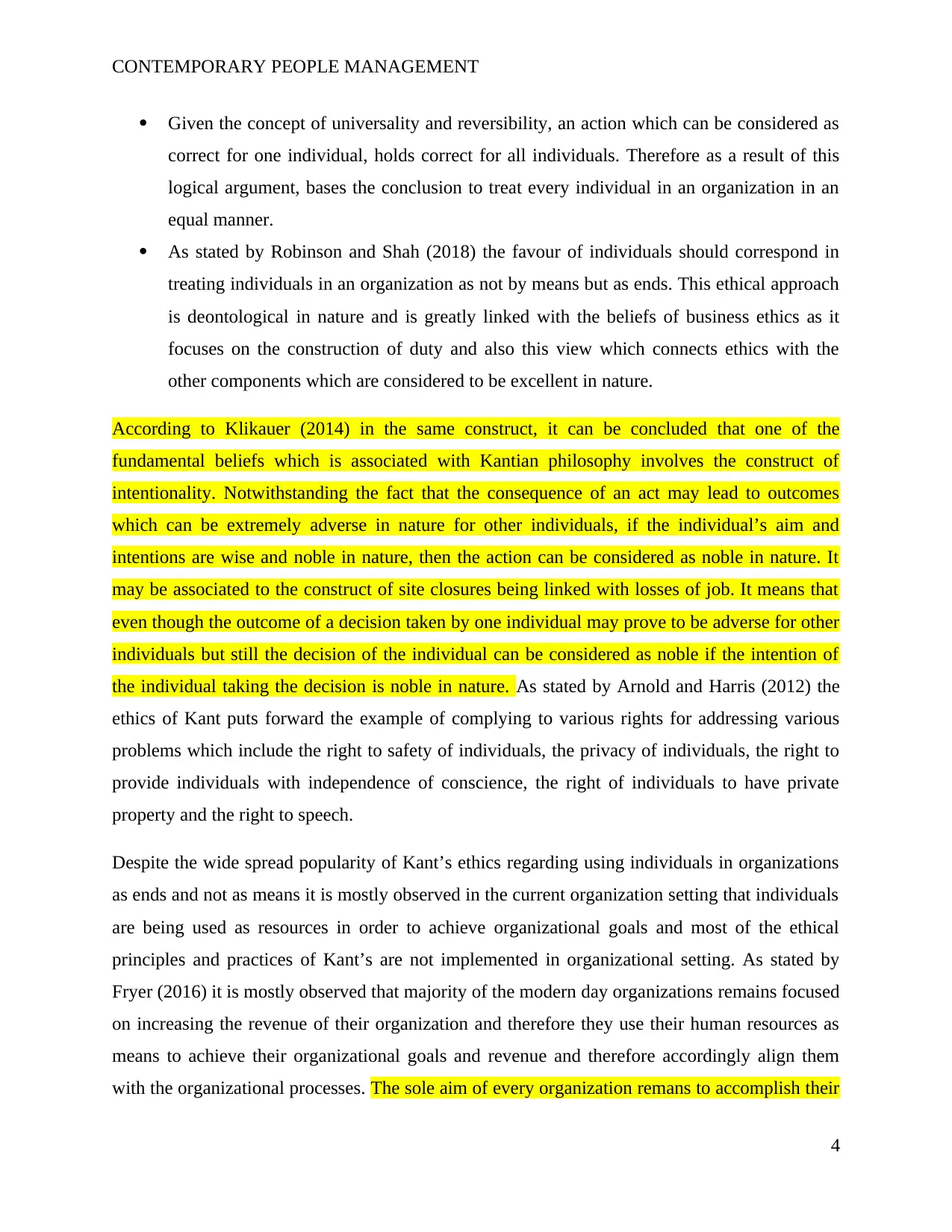
CONTEMPORARY PEOPLE MANAGEMENT
Given the concept of universality and reversibility, an action which can be considered as
correct for one individual, holds correct for all individuals. Therefore as a result of this
logical argument, bases the conclusion to treat every individual in an organization in an
equal manner.
As stated by Robinson and Shah (2018) the favour of individuals should correspond in
treating individuals in an organization as not by means but as ends. This ethical approach
is deontological in nature and is greatly linked with the beliefs of business ethics as it
focuses on the construction of duty and also this view which connects ethics with the
other components which are considered to be excellent in nature.
According to Klikauer (2014) in the same construct, it can be concluded that one of the
fundamental beliefs which is associated with Kantian philosophy involves the construct of
intentionality. Notwithstanding the fact that the consequence of an act may lead to outcomes
which can be extremely adverse in nature for other individuals, if the individual’s aim and
intentions are wise and noble in nature, then the action can be considered as noble in nature. It
may be associated to the construct of site closures being linked with losses of job. It means that
even though the outcome of a decision taken by one individual may prove to be adverse for other
individuals but still the decision of the individual can be considered as noble if the intention of
the individual taking the decision is noble in nature. As stated by Arnold and Harris (2012) the
ethics of Kant puts forward the example of complying to various rights for addressing various
problems which include the right to safety of individuals, the privacy of individuals, the right to
provide individuals with independence of conscience, the right of individuals to have private
property and the right to speech.
Despite the wide spread popularity of Kant’s ethics regarding using individuals in organizations
as ends and not as means it is mostly observed in the current organization setting that individuals
are being used as resources in order to achieve organizational goals and most of the ethical
principles and practices of Kant’s are not implemented in organizational setting. As stated by
Fryer (2016) it is mostly observed that majority of the modern day organizations remains focused
on increasing the revenue of their organization and therefore they use their human resources as
means to achieve their organizational goals and revenue and therefore accordingly align them
with the organizational processes. The sole aim of every organization remans to accomplish their
4
Given the concept of universality and reversibility, an action which can be considered as
correct for one individual, holds correct for all individuals. Therefore as a result of this
logical argument, bases the conclusion to treat every individual in an organization in an
equal manner.
As stated by Robinson and Shah (2018) the favour of individuals should correspond in
treating individuals in an organization as not by means but as ends. This ethical approach
is deontological in nature and is greatly linked with the beliefs of business ethics as it
focuses on the construction of duty and also this view which connects ethics with the
other components which are considered to be excellent in nature.
According to Klikauer (2014) in the same construct, it can be concluded that one of the
fundamental beliefs which is associated with Kantian philosophy involves the construct of
intentionality. Notwithstanding the fact that the consequence of an act may lead to outcomes
which can be extremely adverse in nature for other individuals, if the individual’s aim and
intentions are wise and noble in nature, then the action can be considered as noble in nature. It
may be associated to the construct of site closures being linked with losses of job. It means that
even though the outcome of a decision taken by one individual may prove to be adverse for other
individuals but still the decision of the individual can be considered as noble if the intention of
the individual taking the decision is noble in nature. As stated by Arnold and Harris (2012) the
ethics of Kant puts forward the example of complying to various rights for addressing various
problems which include the right to safety of individuals, the privacy of individuals, the right to
provide individuals with independence of conscience, the right of individuals to have private
property and the right to speech.
Despite the wide spread popularity of Kant’s ethics regarding using individuals in organizations
as ends and not as means it is mostly observed in the current organization setting that individuals
are being used as resources in order to achieve organizational goals and most of the ethical
principles and practices of Kant’s are not implemented in organizational setting. As stated by
Fryer (2016) it is mostly observed that majority of the modern day organizations remains focused
on increasing the revenue of their organization and therefore they use their human resources as
means to achieve their organizational goals and revenue and therefore accordingly align them
with the organizational processes. The sole aim of every organization remans to accomplish their
4
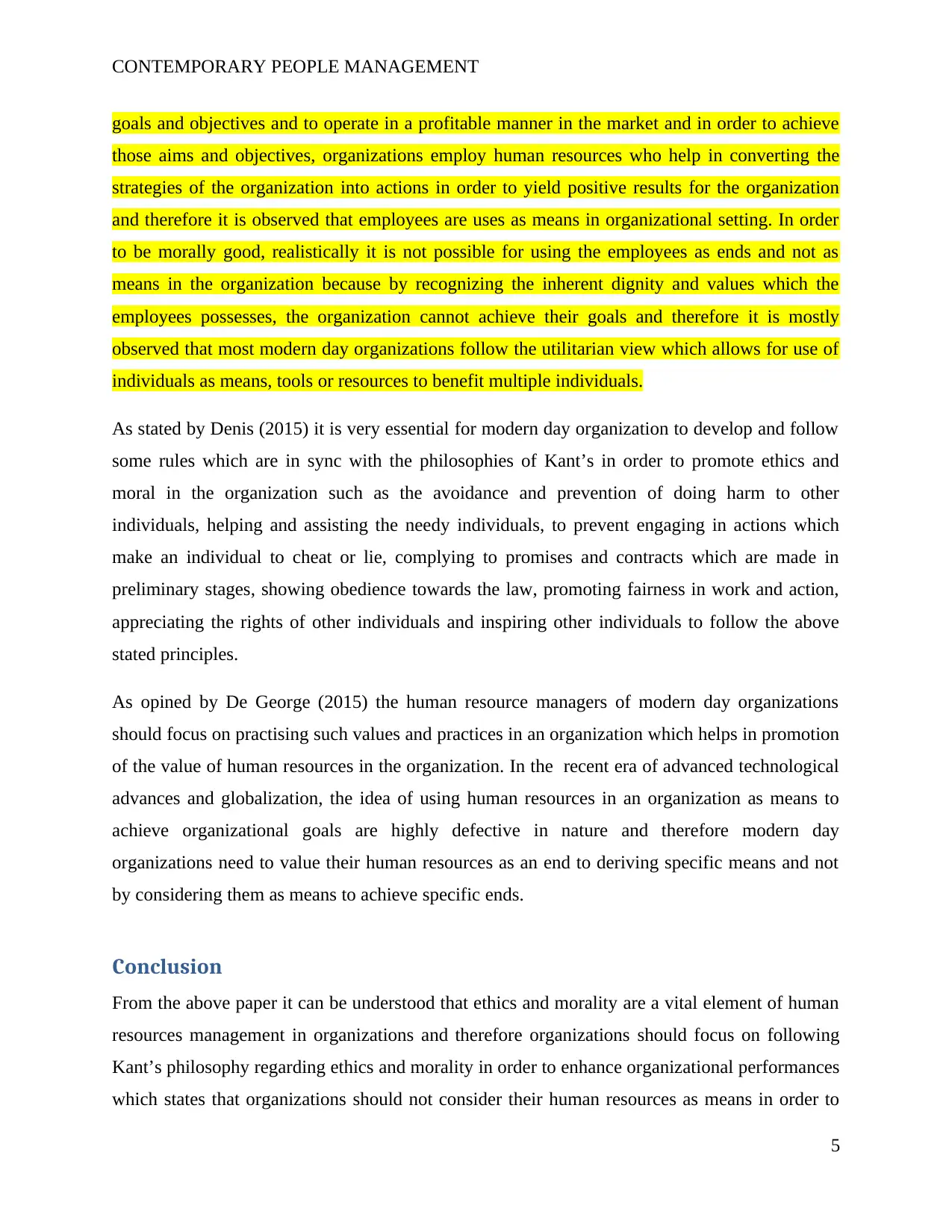
CONTEMPORARY PEOPLE MANAGEMENT
goals and objectives and to operate in a profitable manner in the market and in order to achieve
those aims and objectives, organizations employ human resources who help in converting the
strategies of the organization into actions in order to yield positive results for the organization
and therefore it is observed that employees are uses as means in organizational setting. In order
to be morally good, realistically it is not possible for using the employees as ends and not as
means in the organization because by recognizing the inherent dignity and values which the
employees possesses, the organization cannot achieve their goals and therefore it is mostly
observed that most modern day organizations follow the utilitarian view which allows for use of
individuals as means, tools or resources to benefit multiple individuals.
As stated by Denis (2015) it is very essential for modern day organization to develop and follow
some rules which are in sync with the philosophies of Kant’s in order to promote ethics and
moral in the organization such as the avoidance and prevention of doing harm to other
individuals, helping and assisting the needy individuals, to prevent engaging in actions which
make an individual to cheat or lie, complying to promises and contracts which are made in
preliminary stages, showing obedience towards the law, promoting fairness in work and action,
appreciating the rights of other individuals and inspiring other individuals to follow the above
stated principles.
As opined by De George (2015) the human resource managers of modern day organizations
should focus on practising such values and practices in an organization which helps in promotion
of the value of human resources in the organization. In the recent era of advanced technological
advances and globalization, the idea of using human resources in an organization as means to
achieve organizational goals are highly defective in nature and therefore modern day
organizations need to value their human resources as an end to deriving specific means and not
by considering them as means to achieve specific ends.
Conclusion
From the above paper it can be understood that ethics and morality are a vital element of human
resources management in organizations and therefore organizations should focus on following
Kant’s philosophy regarding ethics and morality in order to enhance organizational performances
which states that organizations should not consider their human resources as means in order to
5
goals and objectives and to operate in a profitable manner in the market and in order to achieve
those aims and objectives, organizations employ human resources who help in converting the
strategies of the organization into actions in order to yield positive results for the organization
and therefore it is observed that employees are uses as means in organizational setting. In order
to be morally good, realistically it is not possible for using the employees as ends and not as
means in the organization because by recognizing the inherent dignity and values which the
employees possesses, the organization cannot achieve their goals and therefore it is mostly
observed that most modern day organizations follow the utilitarian view which allows for use of
individuals as means, tools or resources to benefit multiple individuals.
As stated by Denis (2015) it is very essential for modern day organization to develop and follow
some rules which are in sync with the philosophies of Kant’s in order to promote ethics and
moral in the organization such as the avoidance and prevention of doing harm to other
individuals, helping and assisting the needy individuals, to prevent engaging in actions which
make an individual to cheat or lie, complying to promises and contracts which are made in
preliminary stages, showing obedience towards the law, promoting fairness in work and action,
appreciating the rights of other individuals and inspiring other individuals to follow the above
stated principles.
As opined by De George (2015) the human resource managers of modern day organizations
should focus on practising such values and practices in an organization which helps in promotion
of the value of human resources in the organization. In the recent era of advanced technological
advances and globalization, the idea of using human resources in an organization as means to
achieve organizational goals are highly defective in nature and therefore modern day
organizations need to value their human resources as an end to deriving specific means and not
by considering them as means to achieve specific ends.
Conclusion
From the above paper it can be understood that ethics and morality are a vital element of human
resources management in organizations and therefore organizations should focus on following
Kant’s philosophy regarding ethics and morality in order to enhance organizational performances
which states that organizations should not consider their human resources as means in order to
5
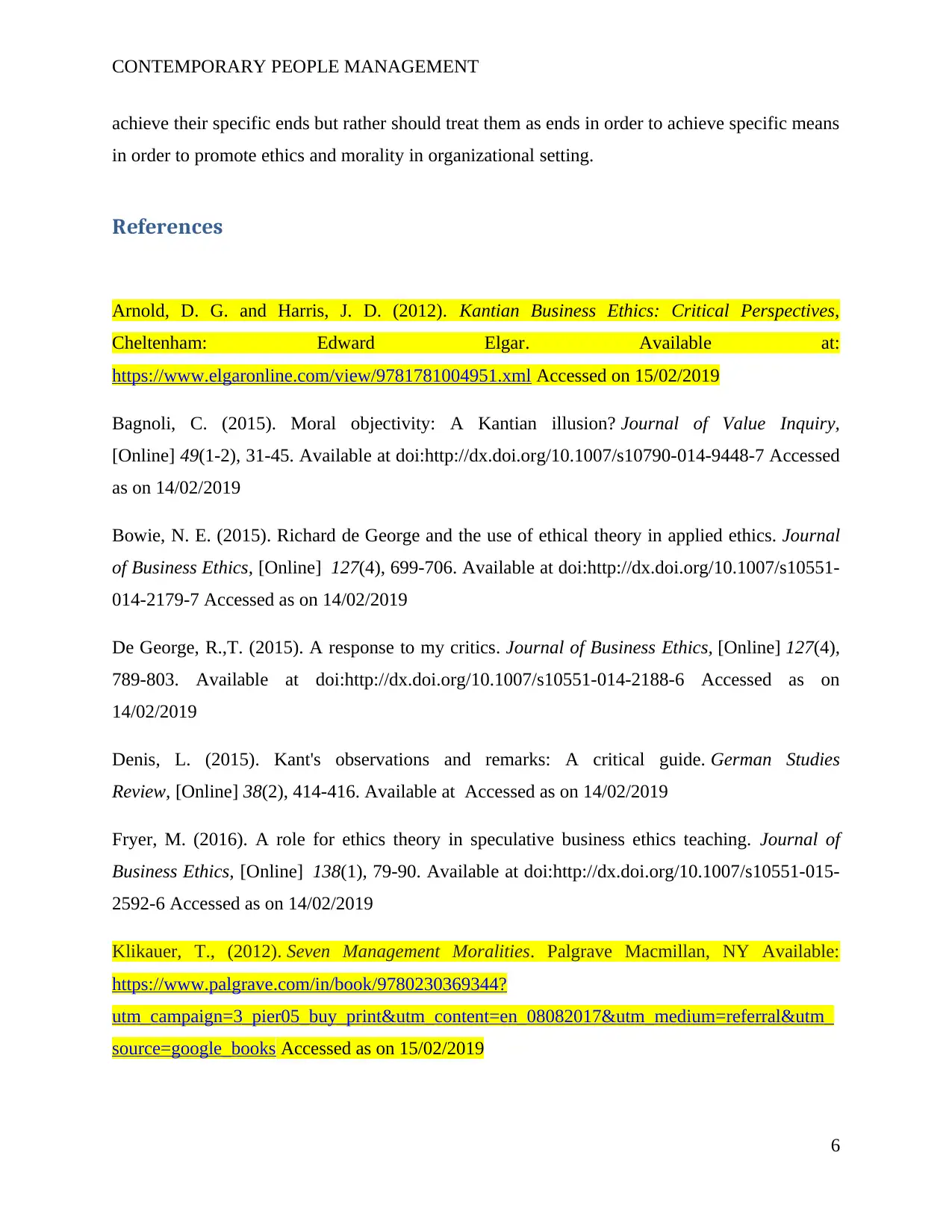
CONTEMPORARY PEOPLE MANAGEMENT
achieve their specific ends but rather should treat them as ends in order to achieve specific means
in order to promote ethics and morality in organizational setting.
References
Arnold, D. G. and Harris, J. D. (2012). Kantian Business Ethics: Critical Perspectives,
Cheltenham: Edward Elgar. Available at:
https://www.elgaronline.com/view/9781781004951.xml Accessed on 15/02/2019
Bagnoli, C. (2015). Moral objectivity: A Kantian illusion? Journal of Value Inquiry,
[Online] 49(1-2), 31-45. Available at doi:http://dx.doi.org/10.1007/s10790-014-9448-7 Accessed
as on 14/02/2019
Bowie, N. E. (2015). Richard de George and the use of ethical theory in applied ethics. Journal
of Business Ethics, [Online] 127(4), 699-706. Available at doi:http://dx.doi.org/10.1007/s10551-
014-2179-7 Accessed as on 14/02/2019
De George, R.,T. (2015). A response to my critics. Journal of Business Ethics, [Online] 127(4),
789-803. Available at doi:http://dx.doi.org/10.1007/s10551-014-2188-6 Accessed as on
14/02/2019
Denis, L. (2015). Kant's observations and remarks: A critical guide. German Studies
Review, [Online] 38(2), 414-416. Available at Accessed as on 14/02/2019
Fryer, M. (2016). A role for ethics theory in speculative business ethics teaching. Journal of
Business Ethics, [Online] 138(1), 79-90. Available at doi:http://dx.doi.org/10.1007/s10551-015-
2592-6 Accessed as on 14/02/2019
Klikauer, T., (2012). Seven Management Moralities. Palgrave Macmillan, NY Available:
https://www.palgrave.com/in/book/9780230369344?
utm_campaign=3_pier05_buy_print&utm_content=en_08082017&utm_medium=referral&utm_
source=google_books Accessed as on 15/02/2019
6
achieve their specific ends but rather should treat them as ends in order to achieve specific means
in order to promote ethics and morality in organizational setting.
References
Arnold, D. G. and Harris, J. D. (2012). Kantian Business Ethics: Critical Perspectives,
Cheltenham: Edward Elgar. Available at:
https://www.elgaronline.com/view/9781781004951.xml Accessed on 15/02/2019
Bagnoli, C. (2015). Moral objectivity: A Kantian illusion? Journal of Value Inquiry,
[Online] 49(1-2), 31-45. Available at doi:http://dx.doi.org/10.1007/s10790-014-9448-7 Accessed
as on 14/02/2019
Bowie, N. E. (2015). Richard de George and the use of ethical theory in applied ethics. Journal
of Business Ethics, [Online] 127(4), 699-706. Available at doi:http://dx.doi.org/10.1007/s10551-
014-2179-7 Accessed as on 14/02/2019
De George, R.,T. (2015). A response to my critics. Journal of Business Ethics, [Online] 127(4),
789-803. Available at doi:http://dx.doi.org/10.1007/s10551-014-2188-6 Accessed as on
14/02/2019
Denis, L. (2015). Kant's observations and remarks: A critical guide. German Studies
Review, [Online] 38(2), 414-416. Available at Accessed as on 14/02/2019
Fryer, M. (2016). A role for ethics theory in speculative business ethics teaching. Journal of
Business Ethics, [Online] 138(1), 79-90. Available at doi:http://dx.doi.org/10.1007/s10551-015-
2592-6 Accessed as on 14/02/2019
Klikauer, T., (2012). Seven Management Moralities. Palgrave Macmillan, NY Available:
https://www.palgrave.com/in/book/9780230369344?
utm_campaign=3_pier05_buy_print&utm_content=en_08082017&utm_medium=referral&utm_
source=google_books Accessed as on 15/02/2019
6
Paraphrase This Document
Need a fresh take? Get an instant paraphrase of this document with our AI Paraphraser
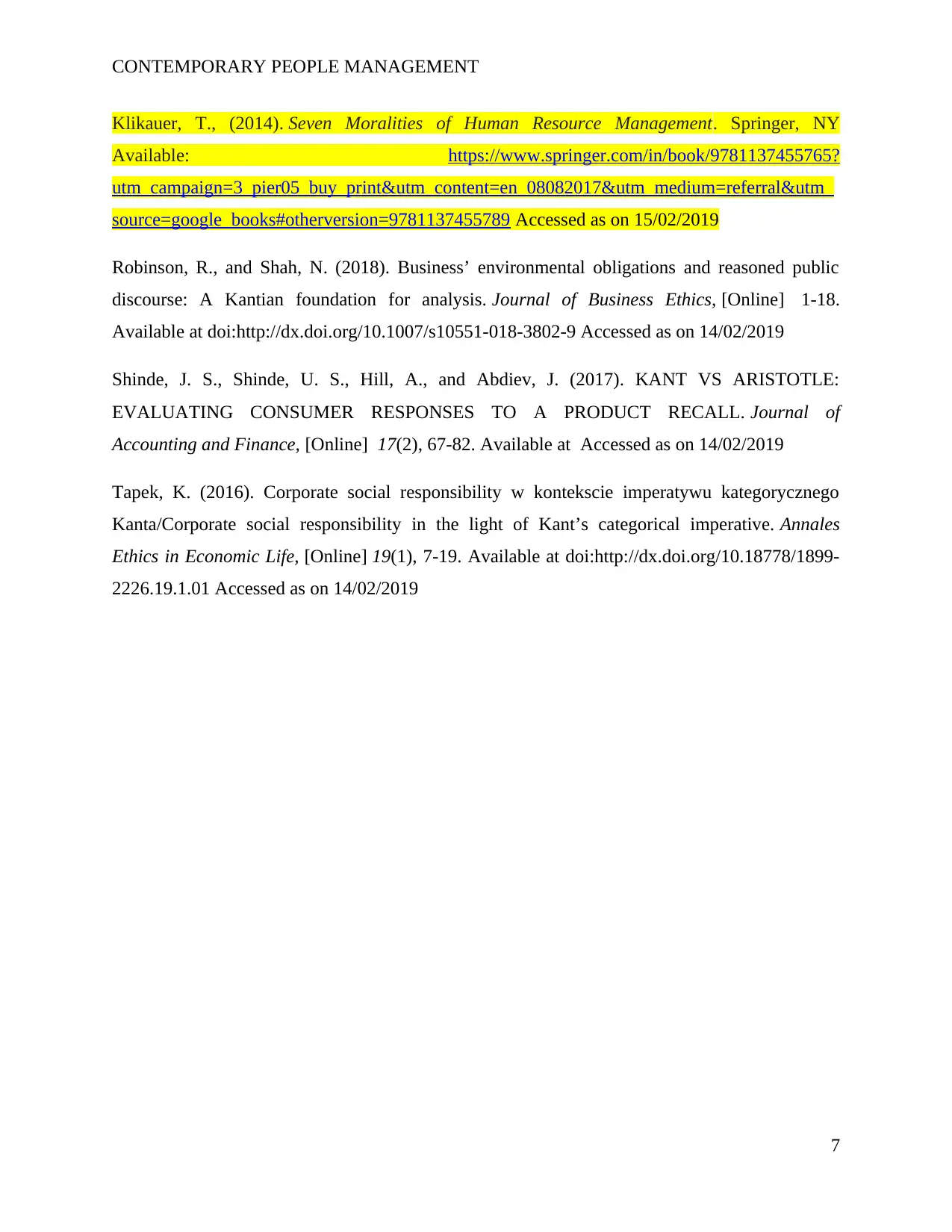
CONTEMPORARY PEOPLE MANAGEMENT
Klikauer, T., (2014). Seven Moralities of Human Resource Management. Springer, NY
Available: https://www.springer.com/in/book/9781137455765?
utm_campaign=3_pier05_buy_print&utm_content=en_08082017&utm_medium=referral&utm_
source=google_books#otherversion=9781137455789 Accessed as on 15/02/2019
Robinson, R., and Shah, N. (2018). Business’ environmental obligations and reasoned public
discourse: A Kantian foundation for analysis. Journal of Business Ethics, [Online] 1-18.
Available at doi:http://dx.doi.org/10.1007/s10551-018-3802-9 Accessed as on 14/02/2019
Shinde, J. S., Shinde, U. S., Hill, A., and Abdiev, J. (2017). KANT VS ARISTOTLE:
EVALUATING CONSUMER RESPONSES TO A PRODUCT RECALL. Journal of
Accounting and Finance, [Online] 17(2), 67-82. Available at Accessed as on 14/02/2019
Tapek, K. (2016). Corporate social responsibility w kontekscie imperatywu kategorycznego
Kanta/Corporate social responsibility in the light of Kant’s categorical imperative. Annales
Ethics in Economic Life, [Online] 19(1), 7-19. Available at doi:http://dx.doi.org/10.18778/1899-
2226.19.1.01 Accessed as on 14/02/2019
7
Klikauer, T., (2014). Seven Moralities of Human Resource Management. Springer, NY
Available: https://www.springer.com/in/book/9781137455765?
utm_campaign=3_pier05_buy_print&utm_content=en_08082017&utm_medium=referral&utm_
source=google_books#otherversion=9781137455789 Accessed as on 15/02/2019
Robinson, R., and Shah, N. (2018). Business’ environmental obligations and reasoned public
discourse: A Kantian foundation for analysis. Journal of Business Ethics, [Online] 1-18.
Available at doi:http://dx.doi.org/10.1007/s10551-018-3802-9 Accessed as on 14/02/2019
Shinde, J. S., Shinde, U. S., Hill, A., and Abdiev, J. (2017). KANT VS ARISTOTLE:
EVALUATING CONSUMER RESPONSES TO A PRODUCT RECALL. Journal of
Accounting and Finance, [Online] 17(2), 67-82. Available at Accessed as on 14/02/2019
Tapek, K. (2016). Corporate social responsibility w kontekscie imperatywu kategorycznego
Kanta/Corporate social responsibility in the light of Kant’s categorical imperative. Annales
Ethics in Economic Life, [Online] 19(1), 7-19. Available at doi:http://dx.doi.org/10.18778/1899-
2226.19.1.01 Accessed as on 14/02/2019
7
1 out of 8
Related Documents
Your All-in-One AI-Powered Toolkit for Academic Success.
+13062052269
info@desklib.com
Available 24*7 on WhatsApp / Email
![[object Object]](/_next/static/media/star-bottom.7253800d.svg)
Unlock your academic potential
© 2024 | Zucol Services PVT LTD | All rights reserved.





